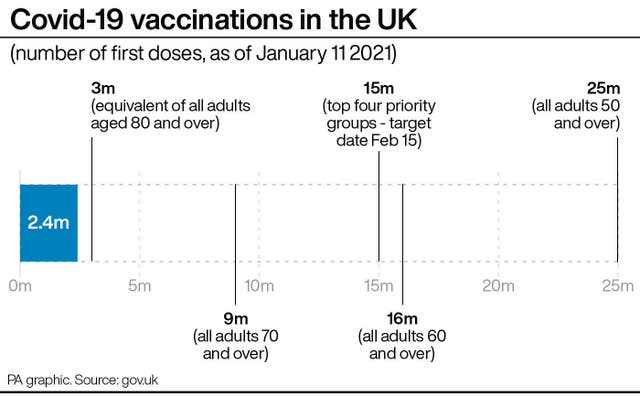AstraZeneca scaling up to two million vaccine doses per week ‘imminently’
Tom Keith-Roach, president of AstraZeneca UK, told MPs the firm was on track to deliver tens of millions of doses in the first quarter of the year.

AstraZeneca is “imminently” scaling up to release two million doses of its vaccine per week in the UK, and may be able to go above that from April, the firm’s chief executive has said.
Tom Keith-Roach, president of AstraZeneca UK, said 1.1 million doses of the company’s Covid-19 jab developed with Oxford University had been released to the UK to date, but the aim was to reach two million doses per week on or before the middle of February.
He told the Commons Science and Technology Committee: “We are scaling up very rapidly – and this will happen imminently – to releasing two million doses a week.
“We’re absolutely on track to do that and therefore deliver tens of millions of doses in the first quarter of the year.
Later, he added: “We are scaling up to two million doses a week imminently and we’d certainly hope to be there on or before the middle of February.”
He said the middle of February was a “conservative position” and said the firm had been asked by the UK Vaccines Taskforce “not to share in public forum in detail daily delivery schedules and locations for security reasons.
“As you can imagine it’s very sensitive, but I can reassure you that we will scale to two million doses per week very quickly.”
Later, he said the firm could not commit to doses above two million per week but it may be they could “increase that somewhat as we move into quarter two”.

He said the manufacture of the vaccine depends on a complex biological process which cannot be carried out more quickly.
“Drug substance manufacture is a 58 to 60-day process that you cannot speed up – that is a complex biological process of actually growing the adenovirus vector,” he said.
Mene Pangalos, executive vice president of biopharmaceuticals research and development at AstraZeneca, added: “You have to grow cells and cells divide at a certain speed, and you can’t do any faster than the speed at which the cells divide.”
Mr Keith-Roach added: “From drug substance, you have to actually manufacture the drug product.
“That includes filling and finishing, packaging, batch release – that takes a further 28 days.
“If you look in total, you’re talking about a three to four-month process.
“Within that you have, as you’d imagine, extensive quality testing on every batch – actually there’s more than 60 quality tests that are performed.”
Mr Zahawi said “this idea that we are sitting on lots of stock is not true”, adding that deliveries of central stocks were unpredictable at the moment.
He told MPs the initial vaccination supply had been “lumpy” but he now had “line of sight” of deliveries to the end of February.
“In any manufacturing process, especially one where you’re dealing with a biological compound, a novel vaccine is lumpy at the outset,” he said.
“There’s no doubt that it was, but getting better. It begins to stabilise and you get much clearer line of sight.
“I now have line of sight of deliveries all the way through until end of February and getting more confidence about March as well.
“We have millions of doses coming through in the weeks and then next month and the month after.”
Later he said: “By the end of the month we’ll be able to deploy two million a week. And then we keep going.”
Asked whether it would go above two million, he added: “Absolutely – of course.”
He added that “day by day, what you’ll see is greater volumes going out”, saying there would be “day-by-day” improvements in the notice given to vaccinators such as GPs of when supplies will arrive.
And he denied reports that vaccines could not be supplied to the NHS on a Sunday, adding there was a 98.5% accuracy to date in the timing of deliveries.
He also said the amount of vaccine currently going to waste in the NHS was significantly less than the 10% forecast by NHS England.
Mr Zahawi, who ruled out vaccine passports, said it was his “instinct” to say “teachers, shop workers, police men and women” should get vaccines after all over-50s and the vulnerable are vaccinated.
Earlier, Mr Pangalos said research had begun to examine the mixing of different vaccines to allow greater flexibility in the system.
“(It’s) something that we’re starting to investigate already, both pre-clinical and clinically.”
He also called for people working in the vaccine process to be prioritised for jabs.





